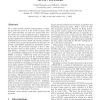543 search results - page 108 / 109 » Implicit Media Knowledge |
BMCBI
2007
13 years 5 months ago
2007
Background: In general, the construction of trees is based on sequence alignments. This procedure, however, leads to loss of informationwhen parts of sequence alignments (for inst...
CORR
2008
Springer
13 years 5 months ago
2008
Springer
Scheduling problems are generally NP-hard combinatorial problems, and a lot of research has been done to solve these problems heuristically. However, most of the previous approach...
IJNSEC
2006
13 years 5 months ago
2006
On a wired network, physical authentication is implicitly provided by access: if a user is able to plug a cable into a network socket, he must have cleared other security checks s...
MST
2000
13 years 5 months ago
2000
We consider the problem of processing a given number of tasks on a given number of processors as quickly as possible when only vague information about the processing time of a task...
ICFEM
2010
Springer
13 years 3 months ago
2010
Springer
The correct behavior of a service composition depends on the appropriate coordination of its services. According to the idea of channelbased coordination, services exchange message...


